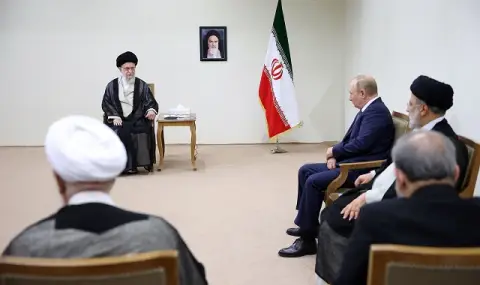Last week Reuters reported, citing its sources in two European intelligence services, that dozens of Russian servicemen are being trained in Iran to use the short-range ballistic missile system "Fath-360". (Fath-360).
According to intelligence agency officials who spoke on condition of anonymity, representatives of the Russian Defense Ministry are believed to have signed a contract in Tehran on December 13 last year with Iranian officials to purchase the "Fath-360" and another ballistic missile system produced by the Iranian state-owned company "Aerospace Industries Organization" (Aerospace Industries Organization), called "Ababil" (Ababil).
Citing multiple confidential intelligence sources, officials said Russian servicemen visited Iran to learn how to operate the Fatah-360 system, which fires missiles with a maximum range of 120 kilometers and a warhead weighing 150 kilograms. One of the sources said that "the only next possible" a step after the training would be actual delivery of the missiles to Russia.
Moscow has a range of ballistic missiles of its own production, but the delivery of the "Fath-360" could allow Russia to use more of its arsenal for targets beyond the front lines, while using Iranian weapons for closer targets, a military expert believes.
Reuters noted that the Russian Defense Ministry did not respond to a request for comment on this information.
Iran's Permanent Mission to the United Nations in New York, for its part, said that the Islamic Republic has established a long-term strategic partnership with Russia in various fields, including military cooperation.
Last week, Iran and Russia also agreed to "speed up" their bilateral relations, Euronews said, referring to a document detailing the meeting between high-ranking political officials of the two countries in Tehran.
Russia's Security Council Secretary Sergei Shoigu visited Iran last Tuesday to meet with Iran's newly elected President Massoud Pezeshkian amid rising tensions in the Middle East.
A document provided by the Iranian government said Pezeshkian listed Russia as one of the "foreign friends" of Iran, while at the same time defining the development of relations as "strategic".
The document also detailed the need for the Iranian side to willingly implement the "agreements" a number of countries, including Russia and Iran, notes "Euronews".
Deepening ties between the armed forces and defense industries of Iran and Russia is just one more aspect of the ways in which Russia's decision to launch its full-scale invasion of Ukraine has begun to increase the pace and scope of cooperation between these US adversaries. commented "Politico" magazine.
Of course, Iran and Russia already had a strong defense relationship before February 2022, Politico notes, but it points out that these have mostly consisted of Tehran buying Russian weapons. Since then, new geopolitical events have changed this paradigm, not only weakening Moscow's ability to deny Iran higher-end technology, but in some cases even forcing it to take the unusual position of trying to acquire Iranian technology , notes the magazine.
After seeing how Ukraine successfully used Turkish drones "Bayraktar TB2" (Bayraktar TB2) in the early stages of the war, Moscow turned to Iran to fill a gap in what was fast becoming a central component of the war - drone warfare, Politico reported. Over the past two years, unmanned aerial vehicles have become a staple of the defense relationship between the two countries. In August 2022, Iran began transferring attack and surveillance drones to Russia, and since then Moscow has used Iranian drones against Ukrainian targets in swarm attacks, seeking to overwhelm Ukraine's limited air defenses.
Iranian drones can be produced cheaply and in large quantities, so even when they are successfully intercepted, if they are shot down by expensive missiles that have a long production life, it costs the Ukrainian defense dearly.
The challenges posed by the deepening ties between Moscow and Tehran - born of a mix of necessity, overlapping interests and a desperate need for what the other partner has to offer - will worry the West for a long time to come, Politico warns. .
The role of Iran in the attacks of the Palestinian group "Hamas" against Israel on Oct. 7 somewhat came as a gift to Russia to ease pressure on its forces in Ukraine and sow discord among Western allies, the magazine said. As evidenced by this ongoing defense symbiosis, Russia and Iran view the wars against Israel and Ukraine as inextricably linked — and the West would be foolish to consider them separate, the paper concludes.
However, analysts believe that while Moscow may see the benefit of turmoil in the Middle East diverting global attention from the war in Ukraine, it would likely be unhappy if a regional war broke out there in which they could quickly be drawn into. several countries, including the United States, writes the magazine "Foreign Policies".
"I don't think Russia really benefits from a full-scale war breaking out there," said Nicole Graevski, a fellow at the Carnegie Endowment for International Peace. and author of a book on Russia-Iran relations, also noting that it could lead to an expansion of Israeli operations in Syria, where Russian forces continue to be deployed.
Other experts warn that Moscow should not be seen as a peacemaker in the Middle East. "I've heard this [idea] raised in various contexts over the years: Syria, Libya, the Sahel," said John Sullivan, former deputy secretary of state and US ambassador to Russia from 2020 to 2022.
"Westerners think: "Well, they have influence. Maybe, just maybe, they will help bring peace. However, they will inevitably come into conflict with the United States and will not have a positive impact," he says. "I do not hope, expect or foresee that the Russians will exercise positive control over Iran," warns Sullivan.
